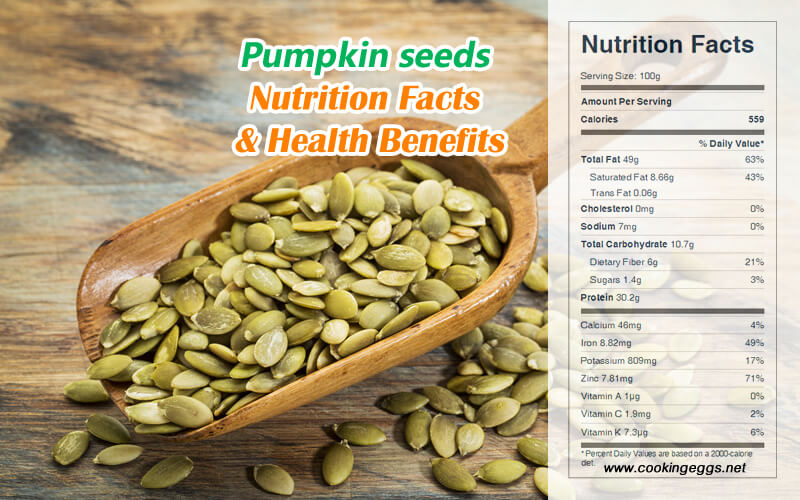Pumpkin and Squash Seeds Nutrition Facts & Health Benefits
Pumpkin seeds, also known as pepitos, are uniquely flavored with a nutty taste and are typically roasted and salted for consumption. Pumpkin seeds are gaining more popularity because of their nutrient content.
Nutritional value of Pumpkin and Squash Seeds
Dried pumpkin seeds are 5.2% water, 49% fat, 11% carbohydrates, and 30% protein.
In a 100 gram reference serving, the seeds provide 559 kcal and a rich source of protein, dietary fiber, niacin, iron, zinc, manganese, magnesium, and phosphorus. The seeds are a moderate source of riboflavin, folate, pantothenic acid, sodium, and potassium. The major fatty acids in pumpkin seeds are linoleic acid and oleic acid, with palmitic acid and stearic acid in lesser amounts.
1 oz of pumpkin seeds provides 158 calories, 3 g carbohydrate, 8.5 g protein, 13.9 g fat, 1.7g dietary fiber, 1.42 mg niacin, 2.5 mg iron, 168 mg magnesium, 1.29 mg manganese, 349 mg phosphorus, 2.21 mg zinc, and 229 mg potassium.

Pumpkin seeds Nutrition Facts Label
Health Benefits of Pumpkin and squash seeds
Pumpkin seeds are rich in B-complex vitamins, protein, calcium, iron, magnesium, zinc, potassium, polyunsaturated fatty acids (PUFAs), phenolics, carotenoids, and c-tocopherol. They are a great plant-based source of omega-6 and omega-3 fatty acids. The individual phenolics found in pumpkin seeds provide them with a significant antioxidant capacity. These include tyrosol, vanillic acid, luteolin, and sinapinic acid. In addition, research has found that the phenolics in pumpkin seeds increase antioxidant enzymes.
Because pumpkin seeds are high in zinc in traditional medicine in many parts of the world, particularly in Eastern Europe, they also have a high reputation as a male sexual tonic and protector of the prostate gland. Semen is particularly rich in zinc, a key factor in prostate gland function and reproductive organ growth. They also have anti-inflammatory properties, which makes them useful in the treatment and prevention of prostate gland enlargement.
In the gut, the availability of zinc may affect the survival of gut bacteria, which impacts the ratio of good versus bad bacteria in the gut. Zinc deficiency in animals has been found to affect the intestines and increase susceptibility to gastrointestinal infection. Supplemental zinc decreases intestinal lipoxidation and decreases intestinal permeability. Hydrochloric acid production depends on zinc, and low stomach acidity can cause a variety of symptoms and digestive problems; decreased levels may indicate a zinc deficiency. Zinc is an important dietary constituent that regulates the gut epithelial wall and modifies the gut microbiome in humans and animals. It has also been seen that beneficial bacteria like lactobacillus and streptococcus in the gut are increased with zinc supplementation.
Eating pumpkin seeds is the easiest way to consume more magnesium.Pumpkin seeds contain the highest magnesium content of all foods. They are also a great source of calcium. Magnesium can help balance calcium metabolism and may contribute to bone health. A mineral balance of magnesium is vital to the well-being of all organisms. Inadequate magnesium intake frequently causes muscle spasms and has been associated with cardiovascular disease, diabetes, high blood pressure, anxiety disorders, migraines, osteoporosis, and cerebral infarction. Higher dietary intakes of magnesium correspond to lower diabetes incidence. For people with diabetes or at high risk of developing diabetes, magnesium supplementation lowers fasting glucose.
Pumpkin seeds are also a great source of iron. Hemoglobin and myoglobin (red blood cells), in addition to certain hormones and connective tissue formations, are essential for aiding in the production of hemoglobin and myoglobin. Iron is required for the synthesis of thyroid hormone and the conversion of tyrosine to dopamine (the happy neurotransmitter). In addition, iron plays a significant role in immune function. A study found that regular consumption of pumpkin seeds was able to reverse iron deficiency anemia in pregnant women.
Pumpkin seeds are a natural anti-inflammatory and may help counteract the kidney stone-forming effects of oxalates found in many dark green, leafy foods that are otherwise high in nutritional value. Pumpkin seeds help reduce the formation of calcium oxalate crystals, which can contribute to bladder and kidney stones and help relieve nausea and erectile dysfunction.
Lastly, pumpkin seeds are also considered a phytoestrogen, similar to flaxseed, sunflower, and sesame seeds. A study found a decrease in the severity of hot flashes and fewer headaches in postmenopausal women who regularly consumed pumpkin seeds.